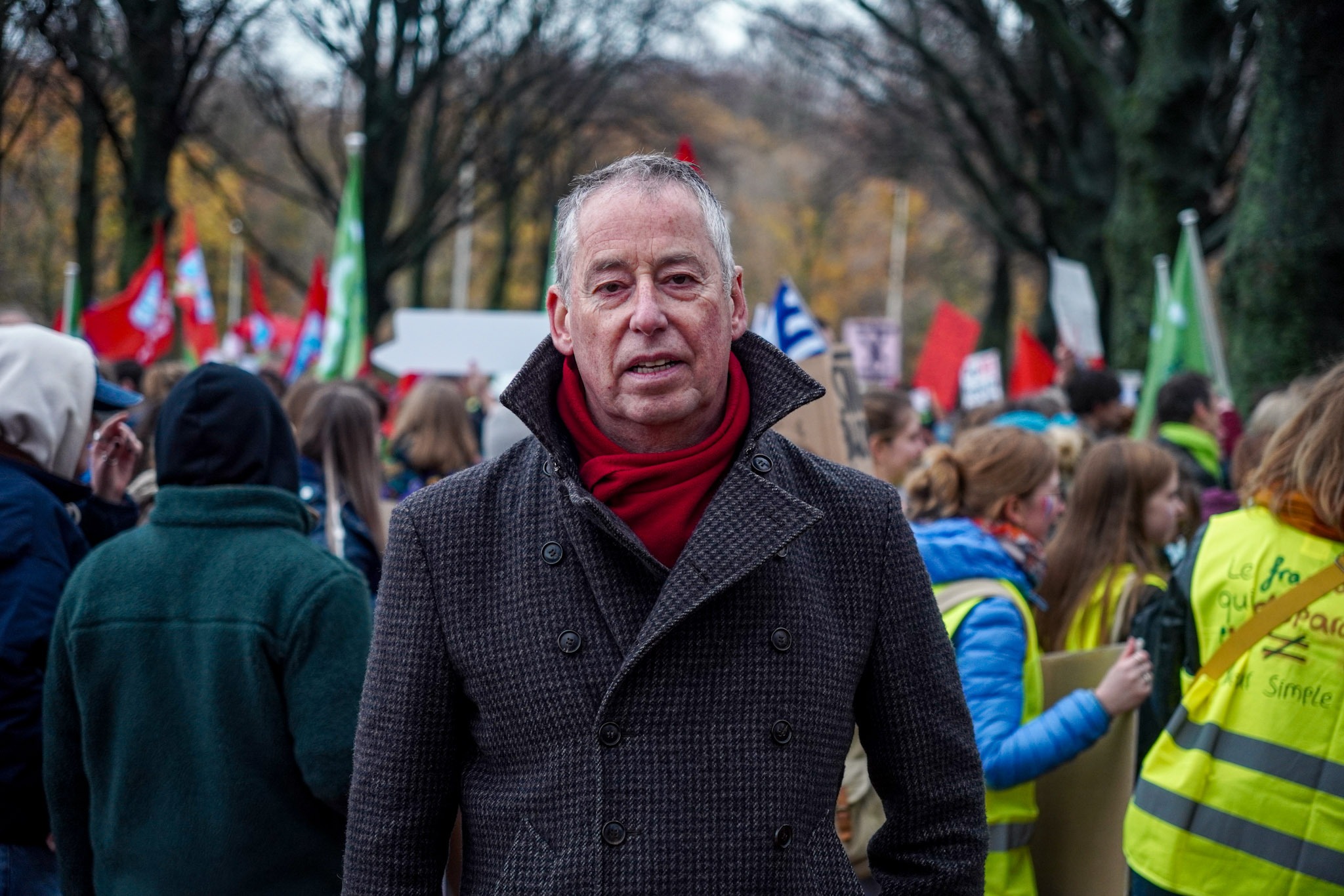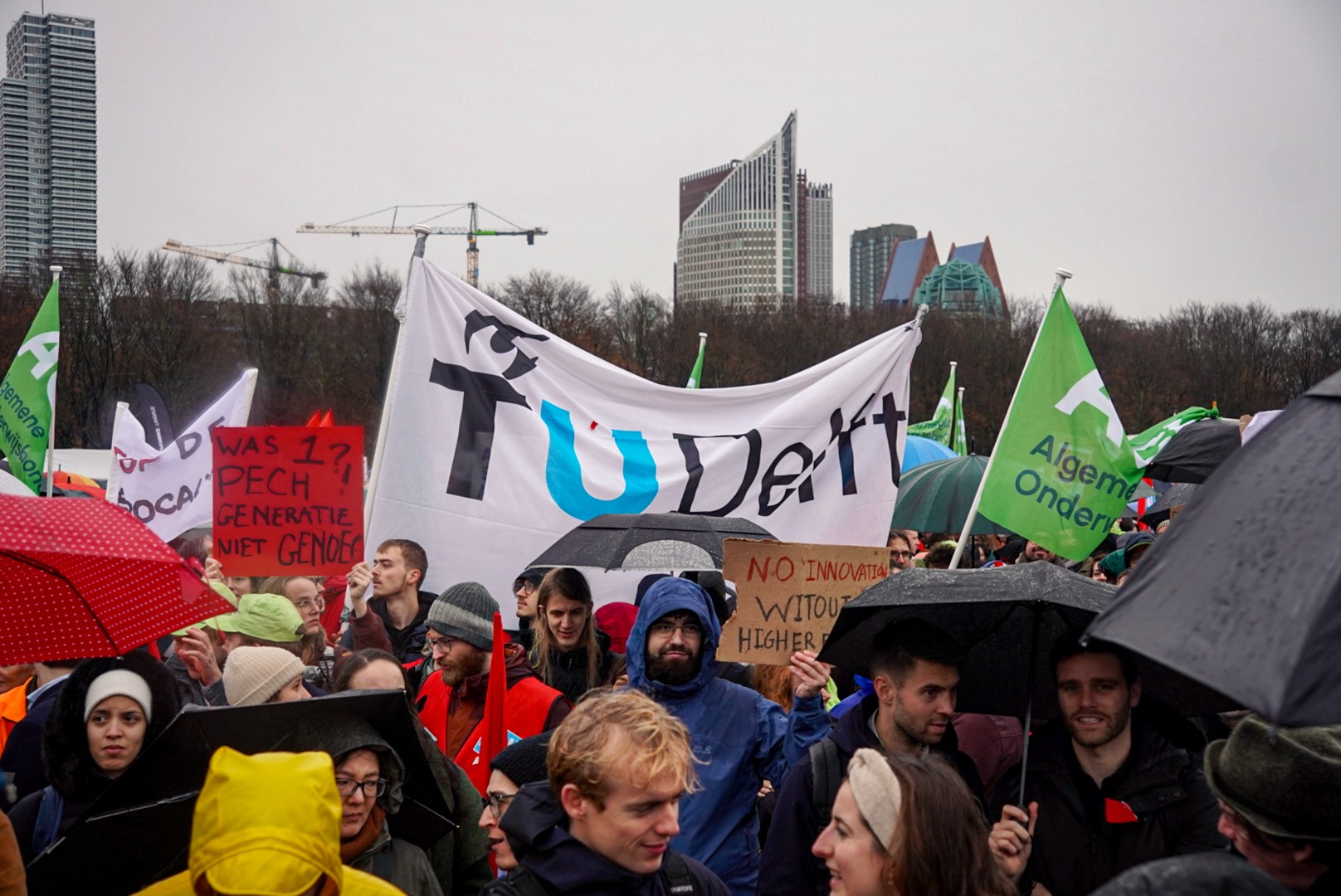Despite train delays and bad weather, it was crowded on the Malieveld in The Hague on Monday afternoon, 25 November. According to the organisers, 20,000 people attended the protest against the announced cutbacks on higher education. Among them were plenty from TU Delft.
A protest at Malieveld in The Hague on 25 November. (Photo: Thijs van Reeuwijk)
Students, staff members , administrators, politicians and trade union representatives from the whole country stand side by side with a shared mission on Monday afternoon, 25 November. They want to make sure that the announced cutbacks amounting to EUR 1 billion will not go ahead. The organisers say that 20,000 people gathered together instead of the anticipated 10,000. They carry banners, flags, hats and chant slogans – against the long-term study penalty and in favour of research, education and innovation. Some people are also demonstrating against investments in defence and the war in Gaza.
Creating awareness
A group of people from TU Delft have gathered in the middle of the field around a large banner bearing the TU Delft logo. Among them are two Board members of the VSSD TU Delft students union. Secretary Sam de Jong thinks it is an impressive event. When he was standing right at the front he did not realise how many people there were. Then he turned around. “I then saw the enormous mass of people. I think it is the biggest higher education protest to date. At least it’s the biggest that I have been to.”
Hanna Pot, a TU Delft doctoral candidate, stands with a group from the Algemene Onderwijsbond (AOb, education union). She is not a member, but an AOb flag was pushed into her hands. “I am here as a citizen of the Netherlands,” she says. “The workload at universities is already extremely high and will only get bigger if these cutbacks go ahead. I hope that this demonstration will at least raise awareness that education is very important.”
‘We will not stop until we have gotten rid of the cutbacks’
Next to Pot is TU Delft post-doc Roy de Winter. He carries a sign saying ‘If only the Cabinet had continued studying’. He thought it up at the train station. The announced cutbacks are making the future uncertain, he says, and he is happy that he ignored the bad weather and just turned up. “This crowd is wonderful.”
Another person from TU Delft speaks on stage. It is Abdelkader Karbache, a student who is the Chair of the Landelijke Studentenvakbond (Dutch Student Union, LSVb) this year. He stirs up the crowd. “We have already gotten rid of the long-term study penalty, we have gotten rid of the loan system, and we will continue. We will not stop until we have gotten rid of the cutbacks.” The crowd cheers.
Jointly

After the speeches, when the crowd starts moving for the march along the Ministry of Education, Culture and Science, that ultimately lasts two hours, Tim van der Hagen leaves the crowd. Apart from him, the Interim Vice-Rector Magnificus Hans Hellendoorn and a number of deans were also at the demonstration. The Rector Magnificus and Executive Board Chair of TU Delft says that he is happy that he was there. “It is very good that we stood here together. We need new knowledge for the major societal challenges in healthcare, the energy transition, climate change and security. If you stop education and research, the whole knowledge and innovation system will stagnate.” He stresses the point that every euro invested in education reaps a return of three to four times the investment.
Van der Hagen finds it hard to understand the thoughts of the Cabinet. “Why did they think up the Balanced Internationalisation Bill for example? Is the idea that the Netherlands looks more inwards? Higher education itself has said that we need tools to regulate the inflow of students. This now seems to mean ‘The Netherlands first. We can do without international students and contact with other countries’. Is this the position they are adopting or is this purely an economising measure amounting to EUR 293 million a year? This is just one of several measures that are intended to save about EUR 1 billion a year. Why? I don’t know either.”
The Rector admits that demonstrating is not really his thing and that the group dynamics is a little scary. He also heard slogans that do not sit with him well. “But if it is needed, and for however long it is needed, I will be there. Fortunately I do see some shifts in society. Mayors, employers, and the opposition in the Senate all view these cutbacks as very unwise. It seems that demonstrating does work.”

Kim Bakker
k.bakker@tudelft.nl

Saskia Bonger
s.m.bonger@tudelft.nl



Comments are closed.